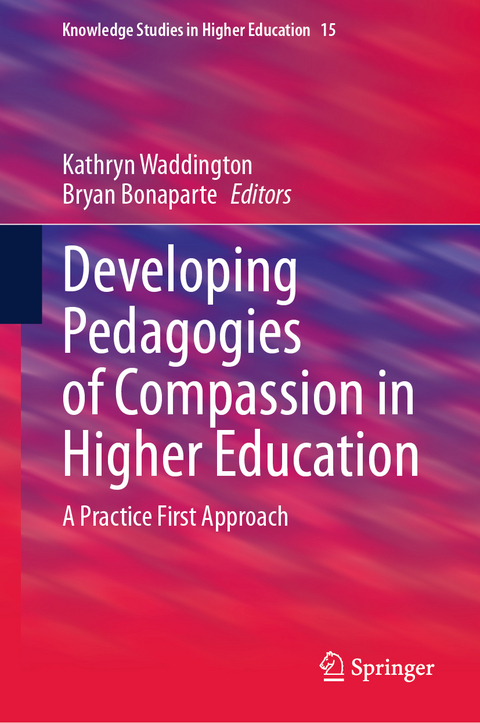
Developing Pedagogies of Compassion in Higher Education
Springer International Publishing (Verlag)
978-3-031-67542-3 (ISBN)
This collection addresses intersections and gaps between practice, theory, and research that both connect and divide compassion and pedagogies. In foregrounding practice, it makes an important contribution to the growing call for universities and educators to adopt inclusive student-centred approaches that challenge us to fundamentally re-think what universities do. It celebrates the role of students as co-creators of knowledge, locating them at the heart of what pedagogies of compassion in higher education should feel like and look like. It examines how compassion can become both critical and strategic in order to disrupt systems and orthodoxies that are no longer fit for purpose in a post-pandemic world. The ultimate goal the book aims to address is the need for humane universities driven by compassion, rather than profit, which can help to build fairer and more socially just societies.
The book extends the theoretical and practical discussions of compassion as a fundamental organizing principle in higher education. It brings fresh interdisciplinary thinking, theories and approaches including the neuroscience of compassion, classical Eastern philosophies, intersectional compassion, sustainability, and environmental stewardship. It also includes critical reflection on experiences, challenges, barriers, and enablers, across multiple levels and perspectives. These range from reflections on compassion in the classroom to compassion in the boardroom, as well as in the many other spaces and places where learning occurs. It offers a creative collection of essays on compassionate practices in higher education, and appeals to anyone who is concerned about the moral standing of the university.
'For some time now, we have been told that universities must be viewed on the business model, but this has only discouraged faculty, students and staff. As the contributors show, however, the very idea that teaching and educational practices could be more closely linked to compassion is definitely appealing, and it gives us a more inspiring way of thinking about the university of the future.'
Richard J. White, Creighton University, Omaha, NE, USA
Kathryn Waddington is Emerita Fellow in Psychology at the University of Westminster, UK, Principal Fellow of the Higher Education Academy and Chartered Coaching Psychologist with the British Psychological Society. She has published widely in the field of compassion, including Towards the Compassionate University, and is a member of the Global Compassion Coalition Education Working Group. Her other main area of scholarship is gossip, which is emerging as an important constituent component of organisational communication and knowledge. Kathryn values academic-practitioner collaboration, social justice, and cares deeply about research that makes a difference in practice.
Bryan Bonaparte is a Senior Lecturer in Social, Educational and Clinical Psychology at the University of Westminster. Bryan is co-founder of the university's Psychology at the Movies initiative, where psychology is discussed via the subjective lens of popular films. He is also Co-chair of the nonprofit social enterprise Black Britain and Beyond. His research interests include exploration of the toxicity of how society constructs and defines masculinity.
Chapter1 Introduction Core Principles and Practices.- Chapter2 Seeing Compassion Through Students' Eyes.- Chapter3 Developing Compassionate Pedagogical Practice with Students as Co-researchers.- Chapter4 The Role of Compassion in Inclusive Teaching and Learning Practice.- Chapter5 A Heart to Hand to Land Based Ethic practising Intersectional Compassion at a Student Run Farm.- Chapter6 Nurturing Compassion in Higher Education An Evolutionary Developmental Neuroscience Perspective.- Chapter7 New Directions in Compassion Curricula and the Science of the Pedagogy.- Chapter8 Theorising Organisational Compassion Could Gossip Help.- Chapter9 Socially Constructing Compassionate Care into Higher Education An Adaption of National Health Service England 6Cs Values.- Chapter10 Lessons from Classical Yoga Traditions on the Cultivation of the Heart Mind.- Chapter11 Reflections on Practices of Everyday Awareness and Mindfulness with Colleagues and Students.- Chapter12 A Narrative Approach to Practising Compassion.- Chapter13 Reflections on Compassion in the Boardroom.- Chapter14 Concluding Reflections Themes Gaps and Questions for the Future.- Chapter15 Coda.
| Erscheinungsdatum | 10.09.2024 |
|---|---|
| Reihe/Serie | Knowledge Studies in Higher Education |
| Zusatzinfo | XX, 293 p. 23 illus., 16 illus. in color. |
| Verlagsort | Cham |
| Sprache | englisch |
| Maße | 155 x 235 mm |
| Themenwelt | Sozialwissenschaften ► Pädagogik ► Erwachsenenbildung |
| Schlagworte | compassionate pedagogy • compassion-based psychoeducation • compassion in UK higher education system • Critical pedagogy • development of a compassionate brain/mind • Eastern philosophies of the heart and mind • everyday awareness as skill in higher education • Higher Education Management • higher education pedagogy • how students view compassion • inclusive learning and teaching • Interpersonal Neurobiology (IPNB) framework • 'intersectional compassionate pedagogy' (ICP) • ‘intersectional compassionate pedagogy’ (ICP) • National Health Service (NHS) 6C's model • National Health Service (NHS) 6C’s model • role of compassion in inclusive learning and teaching practice • 'social brain' • ‘social brain’ • student stories of compassion • Supporting Pedagogies of Compassion in Higher Education • teaching mindfulness • theory-first systems in higher education |
| ISBN-10 | 3-031-67542-8 / 3031675428 |
| ISBN-13 | 978-3-031-67542-3 / 9783031675423 |
| Zustand | Neuware |
| Informationen gemäß Produktsicherheitsverordnung (GPSR) | |
| Haben Sie eine Frage zum Produkt? |
aus dem Bereich


